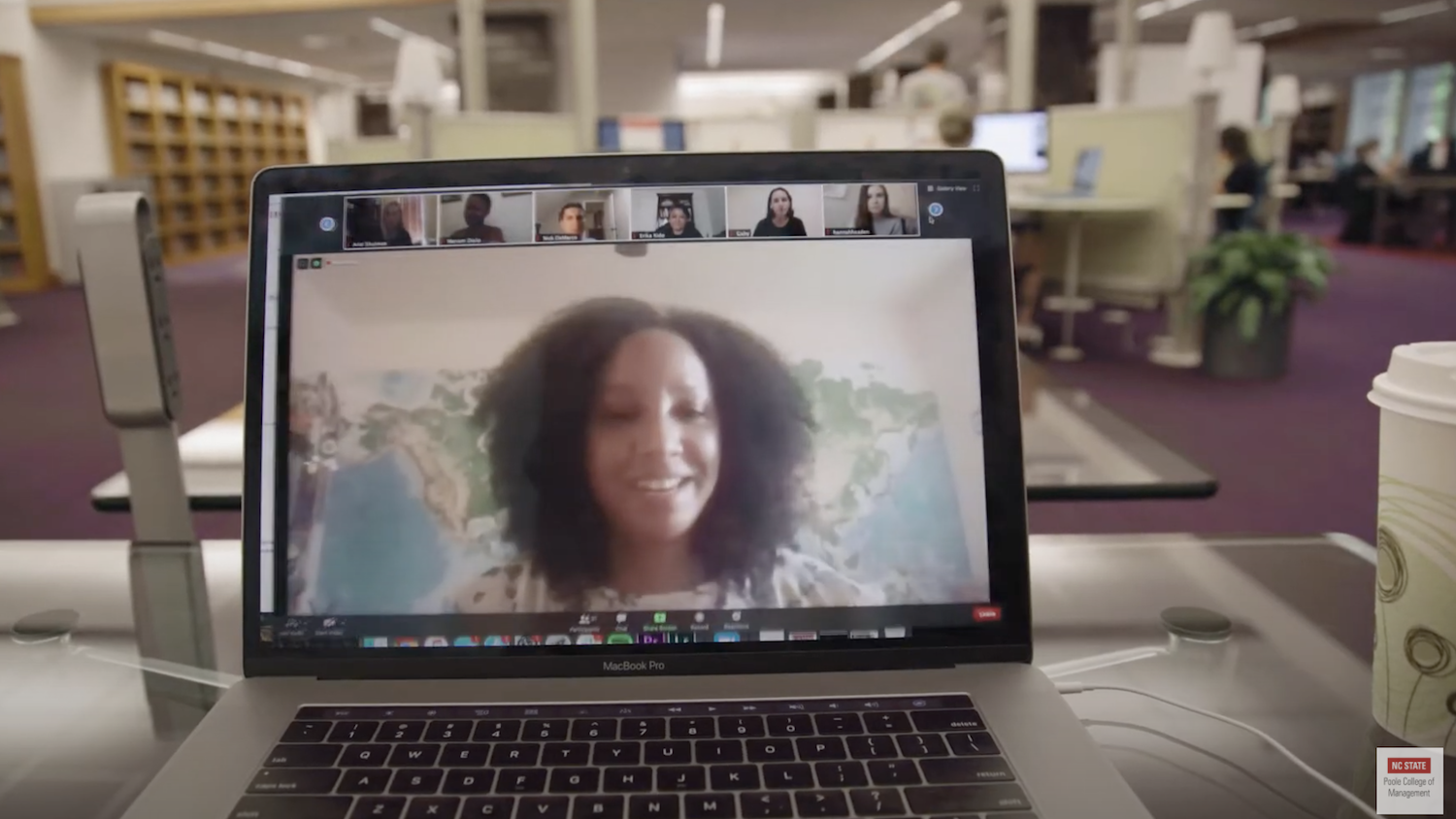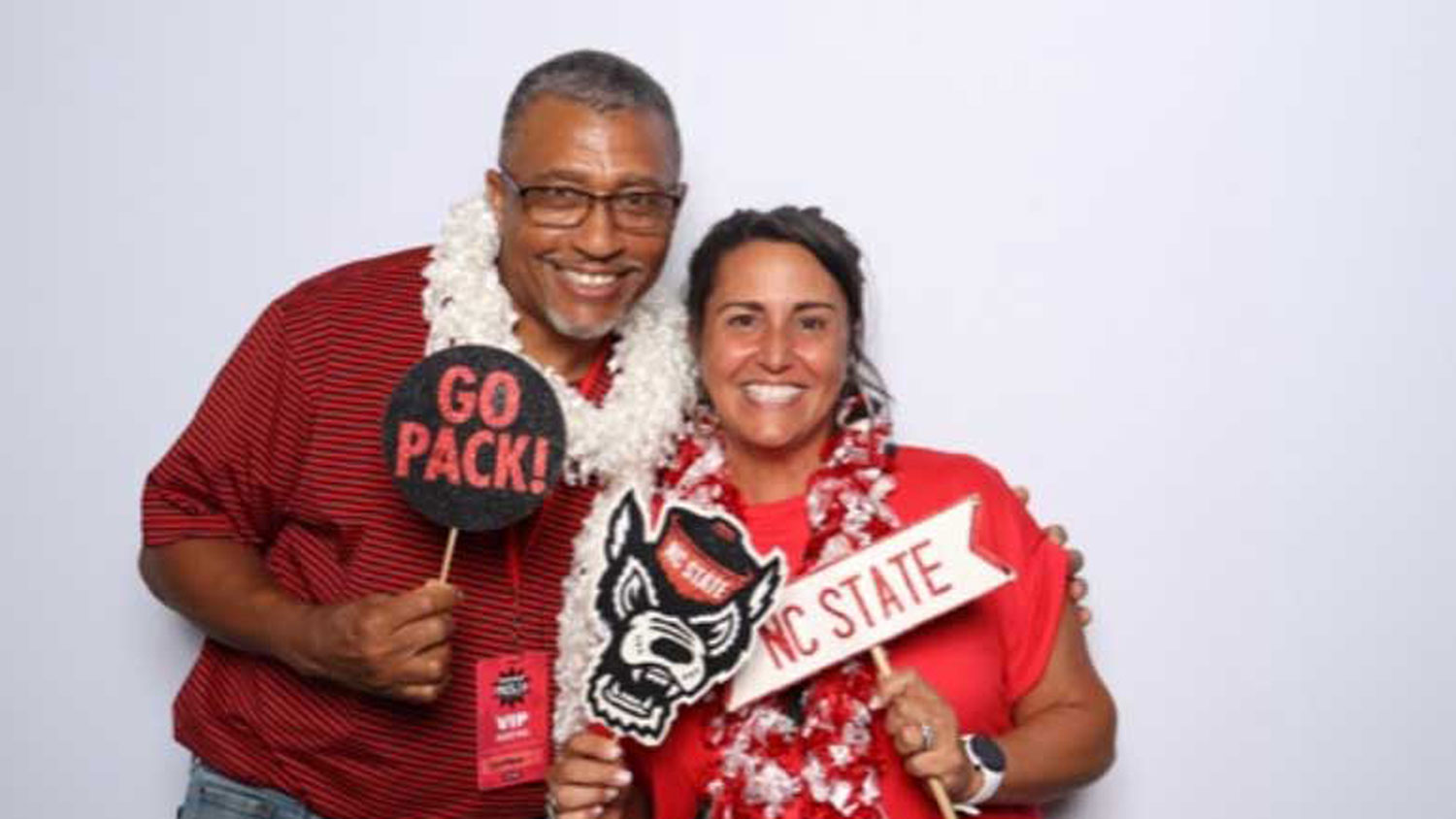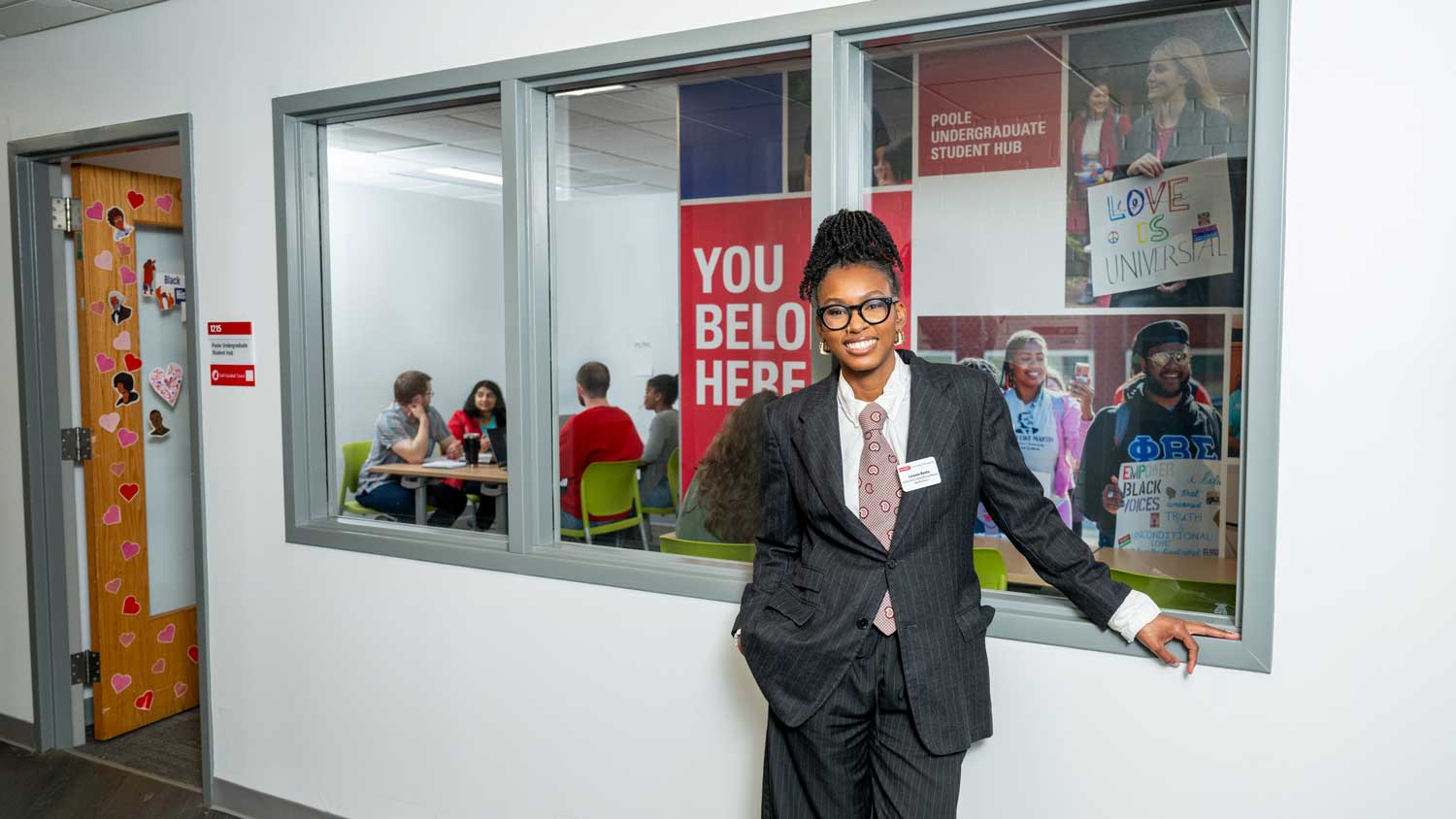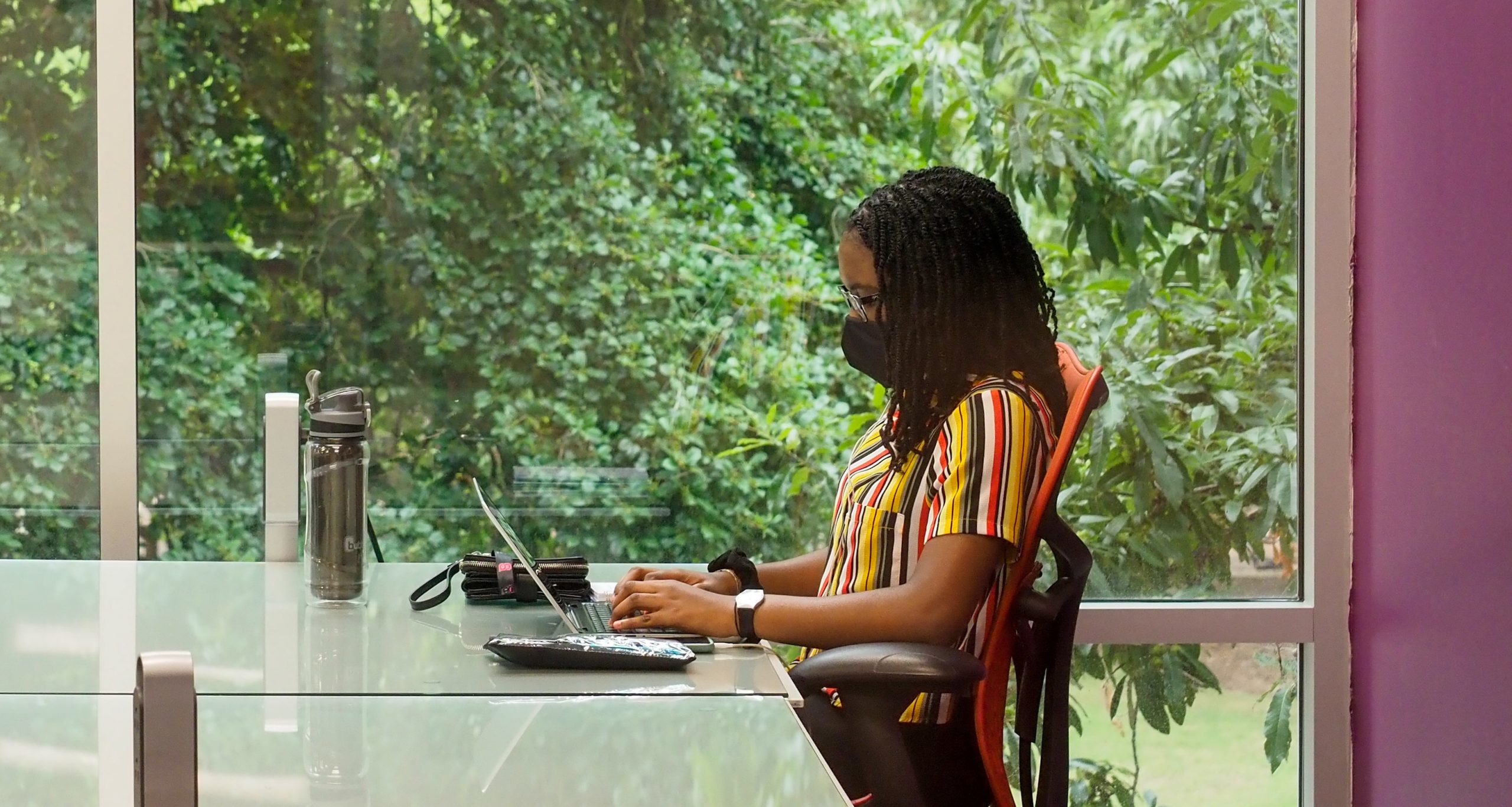
Poole College of Management Pivots to Explore New Opportunities during COVID-19
Poole’s faculty, staff and students have approached COVID-19 the same way they approach every challenge –– as an opportunity to learn, pivot and innovate. Learn how we provide virtual learning opportunities that keep students engaged.
By Caroline Barnhill
As the world faces a public health crisis and a faltering economy, Poole College of Management recognizes that the mission to “think and do” is more important than ever. That conviction has driven Poole to make significant inroads in providing online learning opportunities that keep students engaged –– without compromising on interaction.
At the onset of COVID-19, various digital platforms allowed instructors nationwide to shift their course content online quickly. Still, many educators struggled to maintain the same quality of instruction that they provided inside the classroom. Higher education, in particular, which relies heavily on discussion to facilitate learning, faced enormous challenges.
Though Poole hasn’t been immune to these obstacles, it has looked to them as opportunities for further growth. Bringing energy and thoughtful discussion to the virtual space can be difficult, but the challenge to do so has led Poole to be all the more intentional about building interactive classrooms. Poole’s faculty and students alike have approached COVID-19 the same way they approach every challenge – as an opportunity to learn, pivot and innovate.
Enhancing Delivery of Online and Hybrid Courses
To encourage interaction with course content and application to real-world issues, while also prioritizing the safety of students, Poole is continually working to develop new delivery methods for curriculum.
To this end, Poole brought on Beth Shepherd at its first director of instructional design. Previously the online program manager for the Jenkins MBA Program, a top-ranked program nationally, Shepherd brings a wealth of knowledge to the table – particularly during a time when alternative delivery methods are needed most.

Already, Poole has had great success in the virtual space. In June, the Jenkins MBA Program held its Raleigh Residency Program online and facilitated personal connection for participants. And Poole’s new Virtual Thought Leadership Series, which provides an opportunity to hear from faculty about relevant research driving business innovation, sold out its inaugural event.
Additionally, the Jenkins MAC Program is well positioned for distance learning, as it launched an online MAC platform last fall. Designed specifically with working professionals in mind, the online format was created to offer the same quality and curriculum as the on-campus program – which is good news in the age of COVID-19.
For Poole, the key to every course and every event –– regardless of the format –– is to provide real value to students.
“When professors provide information and content that students can’t get anywhere else –– that’s value,” says Jeff Pollack, associate professor of entrepreneurship at Poole. “Students already have access to a multitude of books, articles and TED Talks. So as educators, we must ask ourselves what content we can give our students that they can’t access anywhere else – and then focus on that. Whether online or in person, we strive to bring them value.”
Adding Value, Multiplying Interaction
For Pollack, adding value means approaching his courses with a high level of personalization. At the start of each course, he identifies where his students are in their personal learning and what they want to receive from the class. Then, he considers how to help them achieve their goals and get them where they want to be.
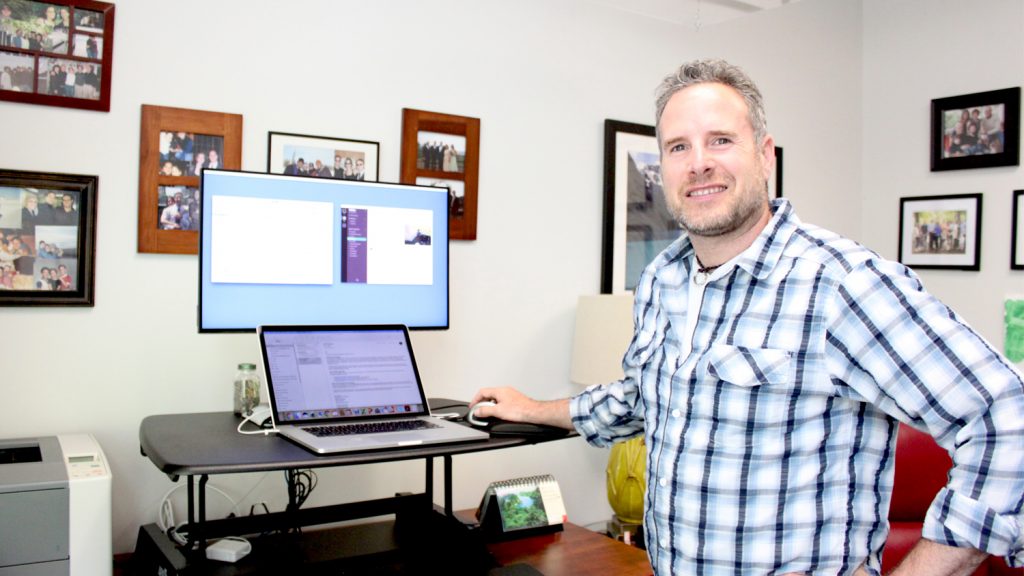
“I see myself as an education entrepreneur, so I’m always thinking about how to create a product that my students find beneficial,” Pollack says. “For every class I teach, I personalize the content and think about how to deliver it in the most effective ways.”
In order to emphasize application in the real world, he offers open-book exams that focus on ideation. His goal is learning and innovation –– not short-term performance.
“I want my students to interact with the content, not regurgitate it,” Pollack says. “I never want my students to think we’re playing a game of who can memorize the most. Just because you can memorize something doesn’t mean you can apply it.”
To encourage interaction, Pollack employs a combination of tactics in his classes. Well before COVID-19 required it, Pollack had begun experimenting with various tools to foster discussion.
In his face-to-face classes, he frequently made use of Top Hat, a software platform that engages students with live polls and anonymous feedback. In classes with hundreds of students, Top Hat helped to stimulate valuable discussion.
“Top Hat is a really fun way to interact with my students and get their feedback quickly,” Pollack says. “I can throw a question on the board and have students text in their answers immediately. I found that I can get a better sense of where my classes are as a whole because it enables me to get numbers, not just a show of hands.”
Though COVID-19 brought large classes like these to a halt, Pollack’s creativity, willingness to experiment and overall approach have positioned him well for a shift to virtual learning.
“My approach to online learning is mostly the same as it was before. I think about how to help students reach their goals, how to provide real value, and how to help students really interact,” he says. “Even if we can’t interact face-to-face, we can interact via the content.”
In his online classes, Pollack assigns projects that facilitate ideation. He has his students send him video pitches for value-creation and offers them opportunities to share their ideas with others, too. Additionally, he emails students twice a week with course content, logistics, a personal message and video check-in – plus a reminder that his students can always contact him.
“The idea of availability is important – even if they don’t take me up on it,” Pollack says.

Another Poole faculty member, Sarah Khan, teaching associate professor of information technology and business analytics, teaches a Business Information Systems course (BUS 340) where students are exposed to different technologies in different business areas –– including information technology, analytics, operations, marketing, and more.
“We train students on how to use a variety of technologies to solve various business problems, as well as introduce them to a variety of technology concepts,” Khan says. “Students find this course extremely valuable and applicable to their degree concentrations and careers.”
Since the course is in such high demand –– around 550 to 800 students take the course each semester –– instructors had to get creative in their instruction methods. They elected to turn it into a hybrid course.
Khan and her colleagues recognized early on that during the online portion of the course, they need to incorporate various strategies to ensure student engagement, such as utilizing online forums to launch class discussions and brainstorm with one another before they meet in-person and introducing gaming concepts to keep the student current with the materials.
“We throw out questions for our students to ponder in the forum, which gives them time to think before our in-class discussion,” Khan says. “And we make sure our students realize that their engagement in the online tasks and discussions impact their grade, which motivates them to engage with the materials on a regular basis.”
Emphasizing Real-World Application with Case Studies
In keeping with making course content relevant to students, Poole works to ensure students find connections between their course topics and real-world events, and has been leading the way in equipping other universities to discuss these sensitive issues as well –– like recent conversations about social injustice.
After seeing Quaker Oats’ announcement about rebranding Aunt Jemima’s name and image due to racial stereotypes, Poole’s associate professor of innovation and marketing, Michael A. Stanko, along with Joseph C. Miller of Saint Ambrose University, thought it would serve as an interesting case study.

Stanko, who teaches core marketing to MBA students and marketing strategy to undergraduate students, often writes case studies for his classes and publishes them through Ivey Publishing for use at other universities worldwide.
Within weeks of hearing about Aunt Jemima’s rebrand, Stanko helped write the case study and corresponding teaching notes along with Miller, who served as lead author, and Miriam Diallo, a second-year Poole MBA student. With a group of several students and alumni, they quickly launched the first online discussion of the case.
“It was a very powerful experience – and emotional for some students,” Stanko says. “We knew this could be a tool that generates similar conversations at other schools around the country and world, so we decided to make it available to other instructors and students.”
To make it readily available, they posted it online, noting that they will offer teaching notes to any faculty member who requests them. Since posting it, the case has been read more than 1,100 times and they have received more than 50 inquiries for the teaching notes.
“It’s a tall order to write a case study and teaching note in a matter of weeks – and we wanted to make sure we did it right,” Stanko says. “But due to the importance of this topic, we wanted to get it into the hands of instructors and students by the fall.”
To guide faculty in discussing this delicate topic, the teaching notes include various resources and best practices for having a respectful, sensitive conversation –– and, in recognizing many colleges and universities are operating in an online environment this fall –– offers options for both remote and hybrid formats.
Given the role that social media played in prompting changes for the brand, Stanko thinks the case study would be well suited to online discussion – either synchronously or asynchronously.
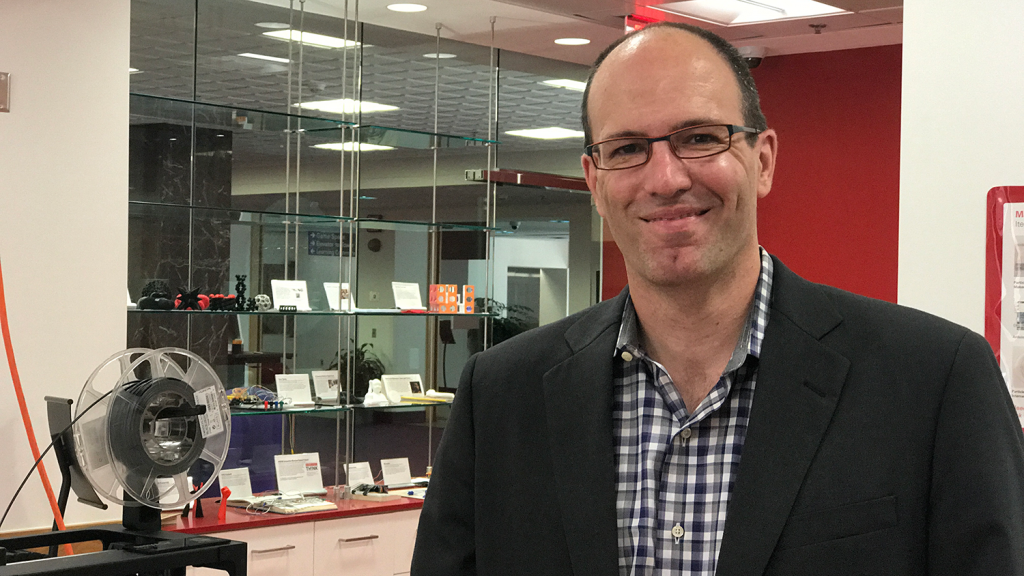
“I like to think of these teaching tactics as semi-synchronous,” Stanko says. “Even if my students aren’t in real time with me, they have time to think and give their perspectives. Synchronous discussion isn’t easy for many of my students –– so giving them time to reflect about an online module improves the group discussion when it happens in real-time.”
Because students learn in different ways, Stanko believes incorporating a variety of semi-synchronous tactics actually benefits students, so long as the course is structured in a way that students know what to expect.
“The most important thing is being just as conscious about the community you’re building online as you would in person,” Stanko says. “Students don’t only learn from their instructors –– they also learn from one another.”
Fostering Community Outside the Classroom
The importance of peer-to-peer interaction has also led Poole to actively think about how to preserve community outside the classroom, despite the challenges involved.
“We know it won’t be a normal semester, but we want to be creative about bringing our community together while also keeping everyone safe,” says Julie Lawson, director of academic advising at Poole. “We want to care for our existing students and connect with the 1,000 new students who will be joining us for the first time this fall.”
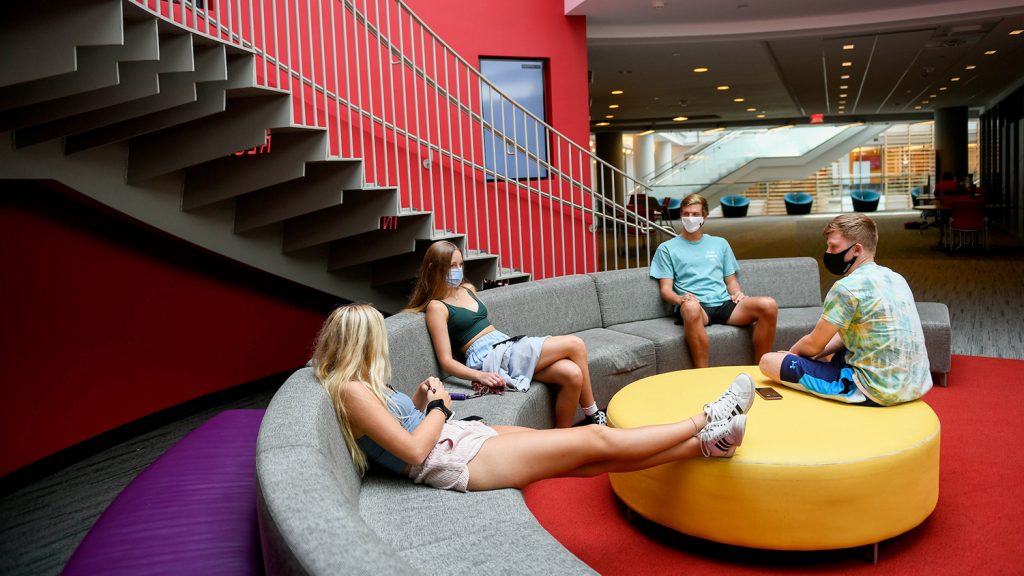
This July, Poole’s Office of Undergraduate Programs welcomed its incoming first-year and transfer undergraduate students in an online student orientation. Although this virtual experience was different from the typical orientation experience, students and their families were able to learn about the resources available to them, connect with other families and students to help welcome them to the Poole family and get them excited for their first semester at NC State.
To keep students informed about various organizations and opportunities for involvement on campus, Poole Council –– composed of the presidents of Poole’s organizations –– is working to coordinate Zoom calls that maintain social distancing.
And in response to recent events, Poole College Office of Diversity and Inclusion has led the way in keeping connected with our students and creating needed space for dialogue during this turbulent time. Partnering with student organizations has proved extremely effective in reaching the Poole community. The Black Business Student Association (BBSA) at NC State has generated online discussions through “virtual listening spaces” in order to provide opportunities for students, faculty and staff to unite online and listen and learn from one another.
The Office of Undergraduate Programs plans to continue supporting students through virtual appointments within the areas of academic advising, career services and global programs. Staff will continue to communicate with students through regular communication sharing resources and upcoming events.
“We want to equip students with as many resources and opportunities for connection as possible,” Lawson says. “If our students need more than we’re providing, we’re ready to hear their feedback and ideas –– and will adapt to provide what they need.”
Making Space for Personal and Professional Growth: Virtual Internships
As students pursue professional development, some of Poole’s Supply Chain Resource Cooperative (SCRC) partners have continued to support them during COVID-19 through virtual internships.
MetLife, a four-year partner with the SCRC, quickly adapted and offered its first remote internship to students.

For Ryan McDonald, a senior in business administration with a concentration in supply chain management, a huge draw to interning with MetLife was the corporation’s scale. Because his previous work experience involved smaller, more intimate teams, he was looking forward to the opportunity to get a better feel for the corporate world –– and then received news that his internship was shifting online.
“I felt extremely fortunate that MetLife provided the opportunity to complete my internship online, but I was initially disappointed that I wouldn’t have the opportunity to build camaraderie with other professionals by way of proximity,” McDonald says. “But the effort everyone has made to make up for that loss has been amazing.”
To promote a welcoming environment for interns, MetLife developed a virtual onboarding session and a virtual “Welcome to Global Procurement” lunch. To maintain a rewarding work experience, MetLife also provided various development opportunities and alternative spaces for connection and collaboration –– including weekly Q&A sessions with senior leadership and industry professionals.
“They have gone to great lengths to ensure I’m getting the most out of this internship as possible,” McDonald says.
And for McDonald, COVID-19 has presented an opportunity to learn and grow as an individual, too. “This has been a unique time to self-evaluate and look for areas of my life to improve and develop,” McDonald says. “Whether it’s learning new skills, developing more interests or nurturing the relationships I really care about, this has been a huge time of personal growth.”
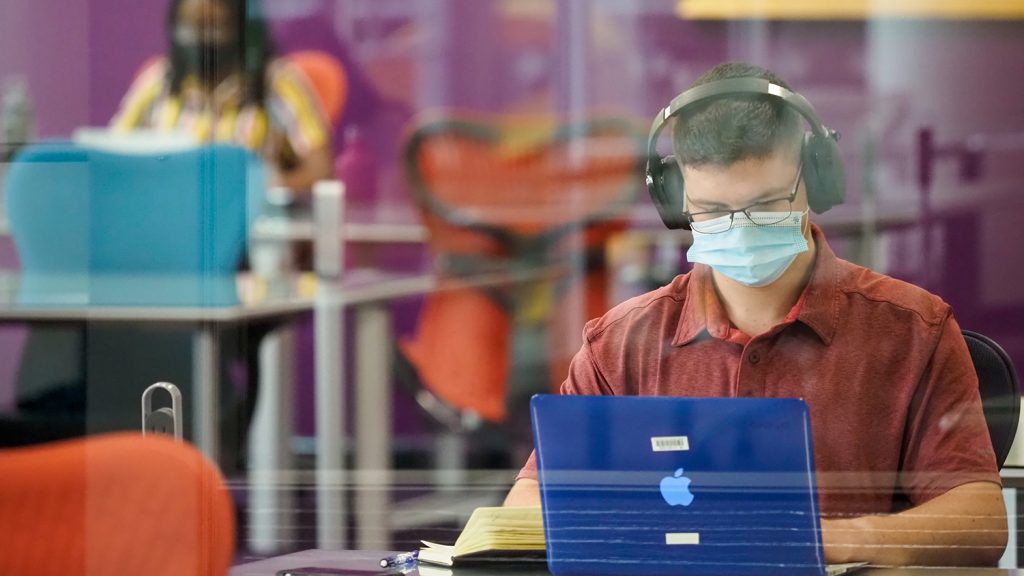
Launching Students Into The World
Between enhanced learning environments, virtual internships, and virtual events to foster discussion, community and collaboration, the Poole community is taking every opportunity to pursue growth and innovation during these difficult times.
Poole faculty, staff, students and partners alike are doing whatever it takes to ensure students are equipped to think and do the extraordinary.
For that reason, Poole has also taken steps to ensure students can connect to meaningful job opportunities. Poole’s Office of Academic Advising is working to coordinate virtual career fairs. Likewise, the Jenkins Career Management Center launched a new virtual career center platform for MBA students.
It’s all part of facilitating environments that enable students to thrive in the global marketplace –– and address our world’s greatest challenges.
“Our students have a unique opportunity right now to create new things in the world, whether products, inventions or ideas,” says Stacy Wood, Langdon Distinguished University Professor of marketing at Poole. “They can innovate solutions in a time when they are most welcomed –– and most needed.”
- Categories:
